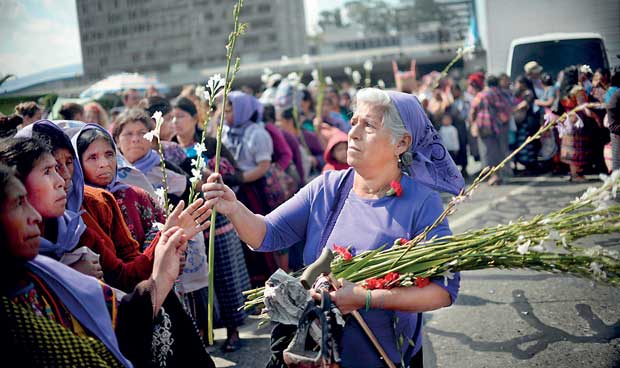Reply To:
Name - Reply Comment
Last Updated : 2024-04-27 07:46:00
 Women demonstrate during the commemoration of the International Women’s Day, in Guatemala City on March 8, 2016 (AFP PHOTO)
Women demonstrate during the commemoration of the International Women’s Day, in Guatemala City on March 8, 2016 (AFP PHOTO)
 As usual, when March 8 rolled around, as it does every year, women all over the world celebrated it in different ways. The International Women’s Day is a fixture on our calendars; yet, in today’s complex world of changing roles and transforming relationships, questions are being asked if we still need it.
As usual, when March 8 rolled around, as it does every year, women all over the world celebrated it in different ways. The International Women’s Day is a fixture on our calendars; yet, in today’s complex world of changing roles and transforming relationships, questions are being asked if we still need it.
For over a century, women have marked the achievements and the plight of women all over the world – yet, it seems true gender equality is still at least 15 years down the road. This year’s theme was ‘Planet 50-50 by 2030’, under which the UN-backed celebrations were held in over 40 countries. The initiative was aimed at reviewing what the 2030 agenda would look like. Would the empowerment of women truly be at the centre of global sustainability plans?
The International Women’s Day came into being at a time when the going was tough for most women throughout the world – not that it has improved much for many. Here in Sri Lanka, women face desperate issues every day. Sexual harassment in public transport, domestic violence, gender-based discrimination are some of the key issue that women face.
Yet, the idea first came when the socialists mulled the idea of advancing women’s suffrage through a day to mark women’s immense contribution to humankind.
An annual ‘international women’s day’ was first organised by the German socialist and theorist Clara Zetkin – there were 100 delegates from 17 countries in March 1911. Over one million people in Austria, Denmark, Germany and Switzerland celebrated it, with hundred100s of demonstrations across the Austro-Hungarian Empire.
The first demands were about obtaining the right to vote – which came to Britain in 1918, but just last year to Saudi Arabia. It has been a challenge elsewhere too. Today, women hold only a fifth of parliamentary seats; only 19 heads of state out of a possible 196 are women, just seven more women than 20 years ago. Much needs to be done, obviously.
Between 1994 and 2014, the number of female Cabinet ministers has at least tripled but at 17 percent, figures still remain low when compared to men. Women are also predicted to face another 118-year wait for the gender pay gap to close. Data shows that a mere 55 of the 500 richest people in the world are women.
It was in 1975, that United Nations mooted the celebrations on March 8, with spotlight falling on the status of women everywhere once a year. Yet, for all its glory, the questions that are being asked about the actual day in question seem relevant.
How far have the issues faced by women dealt with during the time that the day has been celebrated?
Or have the smaller yet significant issues such as economic empowerment at micro level, dealing with domestic abuse, violence in the home, dealing with sexual abuse and blatant violations at office or on public transport, demanding of sexual favours in official and unofficial settings still outstanding?
Could it be that in the well-meaning pursuit of bigger goals, we have lost the plot in addressing these very real issues? We understand that the gender pay gap would take time to close and we understand that we may never truly achieve gender equality but we are keen to see violence against women and girls stamped out and are keen to see sexual harassment addressed.
These are real-time issues for women and they must be solved – while we still find the time to address the goals that loom over us. Instead of focusing on ourselves just once a year, can we do more by sustaining a plan of action that actually can get things done throughout the year?
For the next generation of women, the actual issues would present challenges that they would find they are cut out for. They are ambitious, focused and able to tackle obstacles in a far better way – maybe the preceding generations of women striving to achieve what some take for granted, has sharpened their skills. But they will not be just content with celebrating one day. They would demand more action and less talk and of course, they would be right.
(Nayomini Weerasooriya, a senior journalist, writer and a PR professional, can be contacted at nayominiweerasooriya@gmail.com)

Add comment
Comments will be edited (grammar, spelling and slang) and authorized at the discretion of Daily Mirror online. The website also has the right not to publish selected comments.
Reply To:
Name - Reply Comment
US authorities are currently reviewing the manifest of every cargo aboard MV
On March 26, a couple arriving from Thailand was arrested with 88 live animal
According to villagers from Naula-Moragolla out of 105 families 80 can afford
Is the situation in Sri Lanka so grim that locals harbour hope that they coul

26 Apr 2024
26 Apr 2024